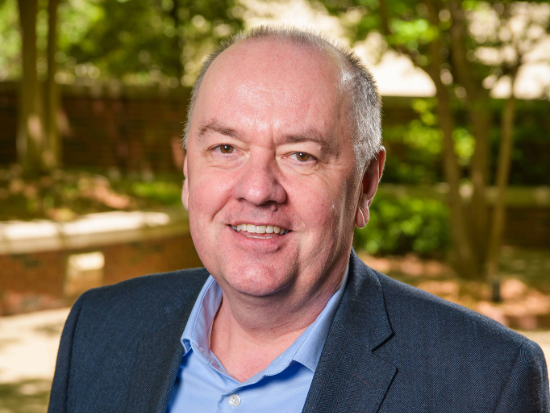 Jan Novak, Ph.D., distinguished professor in the UAB Department of Microbiology, has received a competing continuation for an R01 grant from the NIH for his study, “Molecular Basis of Pathogenicity of IgA1-containing Immune Complexes,” with a total award of $643,133 for the current year, and a total award of $2,505,094 for 4 years. This marks the 15th year of this award, with the overall project spanning from June 1, 2007 to March 31, 2028.
Jan Novak, Ph.D., distinguished professor in the UAB Department of Microbiology, has received a competing continuation for an R01 grant from the NIH for his study, “Molecular Basis of Pathogenicity of IgA1-containing Immune Complexes,” with a total award of $643,133 for the current year, and a total award of $2,505,094 for 4 years. This marks the 15th year of this award, with the overall project spanning from June 1, 2007 to March 31, 2028.
“My main research interests are in glycoimmunobiology, which examines how sugars (glycans) on cell and protein surfaces affect the immune system, and functional glycomics, which explores the roles of glycans in biological processes, especially in the structure and function of antibodies and other glycoconjugates in health and disease,” Novak said. “My goal is to identify disease mechanisms and, based on that information, propose ways to develop new diagnostic and prognosis tools and identify new treatment approaches.”
Novak explains the research that will be supported by this grant and his goals for the study.
Advancing glycosylation research
Novak: To advance research in glycome-oriented analytics, our lab, in collaboration with others, has developed innovative tools, models, and approaches to study glycosylation in health and disease.
These efforts involve interdisciplinary partnerships within UAB and with researchers globally. For this proposal, we’ve optimized methods such as glycoengineering of recombinant IgG or IgA1 using CRISPR-Cas9-modified cell lines and in vitro enzymatic glycan modifications.
We’ve also advanced our understanding of the biosynthesis of O-glycans in IgA1 and identified pathways leading to galactose deficiency, a key factor in IgA nephropathy—a kidney disease characterized by the deposition of immune complexes containing abnormally O-glycosylated IgA1 in the glomeruli.
Our research has identified unique IgG autoantibodies that target these deficiently glycosylated IgA1 molecules, highlighting the autoimmune nature of the disease. Based on our findings, we’ve proposed a new model for the pathogenesis of IgA nephropathy and demonstrated the pathogenic potential of these autoantibodies in vitro and in vivo.
Can you summarize the current understanding of IgA nephropathy and your research findings?
Novak: IgA nephropathy is the most common form of primary glomerulonephritis worldwide, and many patients unfortunately progress to kidney failure. IgA nephropathy is characterized by IgA1 immunodeposits in the kidneys, specifically in the glomeruli. Based on our research, we proposed a hypothesis outlining the sequential steps in the pathogenesis, which has been widely accepted as a framework for developing disease-specific biomarkers and treatments.
Our previous studies found that most patients with IgA nephropathy produce harmful immune complexes containing polymeric IgA1 with some O-glycans deficient in galactose (Gd-IgA1) and lacking sialic acid. These altered IgA1 forms are targeted by IgG autoantibodies, leading to formation of immune complexes in the circulation. Some of these circulating complexes can deposit in the glomeruli and induce kidney injury. We discovered that the IgG in these glomerular immunodeposits specifically targets asialo-Gd-IgA1. Our in vitro and in vivo models showed that:
• Large Gd-IgA1-IgG complexes are pathogenic
• Complement C3 is covalently attached to IgA1 and IgG in these complexes
• C3 is necessary for the biological activity of the complexes in both in vitro and in vivo models
• These complexes activate multiple signaling pathways in mesangial cells
Despite progress in understanding the genetic and biochemical aspects of IgA nephropathy, many gaps remain. To fill these gaps, we will study biospecimens from patients with IgA nephropathy who have either progressive or non-progressive disease to identify factors linked to disease progression.
What is the main objective of your study, and how do you intend to accomplish it?
Novak: Based on our pilot experiments, we hypothesize that IgA1-containing immune complexes from the patients with progressive disease exhibit greater biological activity than those from patients with non-progressive IgA nephropathy. We also hypothesize that differences in complex composition affect their biological activity.
To test these hypotheses, we will:
1. Assess the size and biological activity of circulating IgA1 immune complexes from patients with progressive versus non-progressive IgA nephropathy, focusing on their ability to induce cellular proliferation, signaling, and cytokine production in mesangial cells.
2. Analyze the molecular O-glycophenotypes of IgA1 in these immune complexes.
3. Investigate the effects of C3 processing and complement-regulating proteins on the activity of IgA1 immune complexes.
To achieve these goals, we have assembled a multidisciplinary team and will utilize our access to well-characterized clinical samples along with innovative in vitro and in vivo models of IgA nephropathy. The participating researchers at UAB include (in the alphabetical order) Joshua Anderson, Scott Barnum, Jamie Clemons, Gary Cutter, Todd J. Green, Stacy Hall, Zhi-Qiang Huang, Bruce A. Julian, Zina Moldoveanu, Lea Novak, William Placzek, Colin Reily, Matthew B. Renfrow, Dana Rizk, Qing Wei, and Christopher Willey. The project has a subcontract with Dr. Maillard in France who will provide biosamples from well characterized patients with IgA nephropathy and contribute with his expertise on IgA nephropathy and the role of complement.